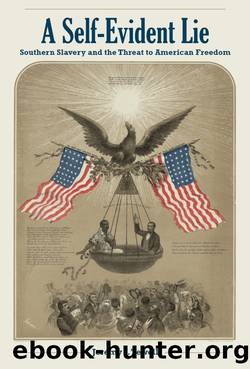A Self-Evident Lie by Jeremy J. Tewell

Author:Jeremy J. Tewell [Tewell, Jeremy J.]
Language: eng
Format: epub
Tags: History, United States, Civil War Period (1850-1877)
ISBN: 9781606352250
Google: UsHuoAEACAAJ
Publisher: Kent State University Press
Published: 2014-04-14T15:58:54+00:00
5
The Slaveocracy
Given most Southernersâ apparent embrace of an Old World social order, some Northerners feared the rise of an aristocracy in the United States. This fear was implicit in northern denunciations of the Slave Power, the slaveocracy, and the southern oligarchy, as it was in their comparisons of southern slavery with medieval serfdom and divine-right monarchy. All the arguments Southerners advanced in favor of slavery had been used at one time or another in the defense of hereditary privilege. They insisted that laborers were better off in a state of servitude, and that society benefited from the suppression of the poor and the contributions of the leisure class. Consequently, as some Northerners came to believe that Americans of any race could fall victim to proslavery arguments, they worried that slaveholders, debauched by power and luxury, would use their wealth and political influence to transform Americaâs egalitarian experiment into a European-style hierarchy.
First, Northerners had a detailed understanding of the constitutional provisions and political arrangements that gave Southerners a disproportionally large share of political power in the national government. Second, they believed the experience of mastery fostered a tyrannical disposition among slaveholders. In short, slavery taught behaviors contrary to those necessary for a viable republic. It effectively destroyed the republican principle of âvirtue.â Furthermore, the degradation of the southern work ethic led to a disparity of wealth that could not sustain an egalitarian society.
Fear of the slaveocracy was one of the most common themes in the antislavery movement. In 1853, the abolitionist William Jay, president of the New York City Anti-Slavery Society, estimated that there were no more than 248,000 slaveholders in the United States. âYet this small body of men engross the greater portion of the slave region, forming in fact a powerful feudal aristocracy, possessing nearly three millions of serfs, and governing and oppressing at pleasure the rest of the population.â In addition to the South itself, many Northerners believed that the slaveholding minority dominated the national government, riding roughshod over the peopleâs rights and shaping national policy to serve their own interests. During the debate over the Kansas-Nebraska Act in 1854, Henry Bennett of New York argued that southern slaveholders had more political influence âthan any aristocracy of Europe.â William Lloyd Garrison likewise believed that the evils inflicted by the Slave Power âare worse than ever were inflicted by the most kingly aristocracy, or the most despotic tyranny.â And according to Moses M. Davis of Wisconsin, âthe tyrannical Slave power has got possession of the people, and will crush out their liberties before many more years pass by.â1
Nevertheless, historians have long debated the legitimacy of the âslave-power conspiracy.â Writing in the early 1870s, Henry Wilson suggested that âfreedom became timid, hesitating, [and] yieldingâ after the Missouri crisis, while âslavery became bolder, more aggressive, and more dominating.â Wilson, of course, was recounting his own experiences as a Republican senator in the 1850s. After the publication of Chauncey Boucherâs influential article âIn Re That Aggressive Slaveocracyâ in 1921, many historians dismissed the Slave Power thesis, viewing it primarily as an example of paranoia in American politics.
Download
This site does not store any files on its server. We only index and link to content provided by other sites. Please contact the content providers to delete copyright contents if any and email us, we'll remove relevant links or contents immediately.
Warrior Queens & Quiet Revolutionaries by Kate Mosse(125)
A Rome of One's Own by Emma Southon(93)
The Evidence of Things Not Seen by James Baldwin(78)
A Teacher's Guide to Ladies of Liberty by Cokie Roberts Amy Jurskis(76)
The Grey Eagles of Chippewa Falls by John E. Kinville(76)
Rethinking White Societies in Southern Africa by Duncan Money(74)
Continental Strangers by Gemunden Gerd;(72)
The Crosswinds of Freedom by James MacGregor Burns(71)
The Slave Ship, Memory and the Origin of Modernity by Martyn Hudson(69)
Women's Voices in Ireland by Caitriona Clear(66)
Beware the Masher by Kerry Segrave(64)
A Warring Nation by Bertram Wyatt-Brown(63)
A Self-Evident Lie by Jeremy J. Tewell(63)
Room 306 : The National Story of the Lorraine Motel by Ben Kamin(60)
Sensing Chicago by Adam Mack(59)
Jerusalem on the Amstel by Lipika Pelham(56)
Facing Freedom by Daniel B. Thorp(56)
Cooking in Other Women's Kitchens by Rebecca Sharpless(55)
A Troublemaker May Surprise (The Troublemaker Series Book 2) by Genta Sebastian(53)
